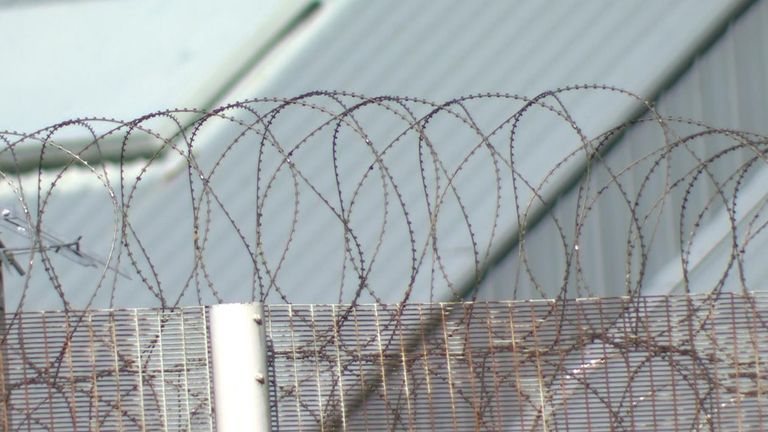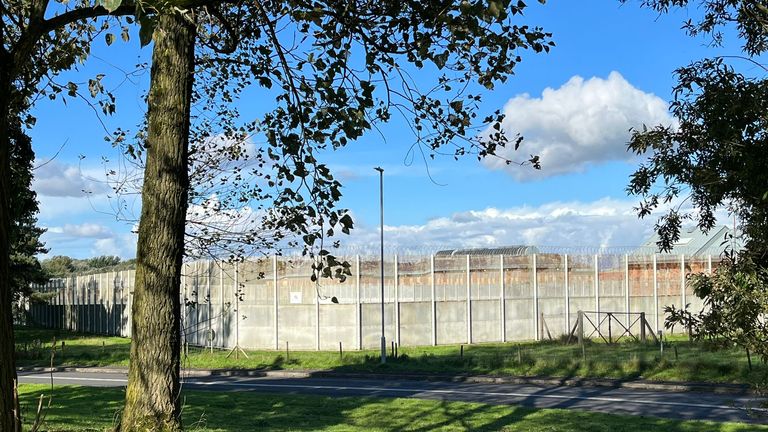Families have called for an inquiry into mental health provision for offenders languishing on indefinite jail terms – saying it could “save lives”.
Relatives of offenders still serving a now-abolished open-ended jail term, known as imprisonment for public protection (IPP), believe resources are so “starved” that the remaining prisoners now have “life-long mental health issues”.
They have written to parliament’s Justice Select Committee urging it to hold an inquiry now a new government is power.
In letters to the committee seen by Sky News, family members directly attribute the deterioration of their loved ones’ mental health to the prison sentence which has no release date and has been described as a form of “psychological torture” by human rights experts.
Clara White, whose brother Thomas White has served 12 and a half years in prison for stealing a mobile phone, told the MPs on the committee – which is yet to be formally set up following the general election – that her brother now lives with psychosis as a result of the IPP sentence.
“From the year 2016 Thomas has been displaying religious hallucinations, religious delusions and unusual ways of thinking,” she wrote.
“The prison environment and long 12-and-a-half-year incarceration is the reason Thomas now lives with paranoid schizophrenia.”
“The purpose of my letter is to ask will you consider opening an inquiry into mental health provision,” she added.
“I am certain this would save lives in custody.”
Please use Chrome browser for a more accessible video player

1:06
What is an IPP sentence?
What are IPP sentences?
IPP sentences were a type of sentence the courts could impose from 2005 until they were abolished in 2012.
They were intended for serious violent and sexual offenders who posed a significant risk of serious harm to the public but whose crimes did not warrant a life term.
Although the government’s stated aim was public protection, concerns quickly grew that IPP sentences were being applied too broadly and catching more minor offenders, who often ended up serving years beyond their initial term.
The coalition government scrapped the sentence in 2012, but the change was not applied retrospectively, meaning nearly 3,000 prisoners remain behind bars – including about 1,200 who have never been released.
To date, 90 people serving IPP sentences have taken their own lives in prison.
In light of the overcrowding crisis that has engulfed UK prisons, the Ministry of Justice is under pressure from campaigners to consider a resentencing exercise for IPP prisoners, which could result in them being given a release date for the first time.
Please use Chrome browser for a more accessible video player

6:00
‘Psychological torture’ of IPP sentences
‘IPP has destroyed us as a family’
Cherrie Nichol’s brother Aaron Graham was 26 years old when he was sentenced to two years and 124 days for committing grievous bodily harm in 2005. He remains in prison 18 years later.
In her letter to the committee, Ms Nichol said her brother was now a “shadow of his former self” and had suffered “catastrophic” mental health problems as a result of his IPP sentence.
“Not knowing where his life is going and when he may be released has painfully destroyed him and us as a family,” she wrote.
Read more from Sky News:
PM names new chief of staff after Sue Gray resigns
After Gray’s exit, PM and team have stabilisation job to do
She said she did not believe the prison service has been “properly equipped to deal with the backlash of the abolished IPP”, leaving many “languishing with no hope and no future and professionals coming and going and not being able to make decisions”.
“We are desperate as family members and campaigners to really push for you to acknowledge the mental health issues caused by the IPP,” she added.
Prisoners ‘must not be forgotten’
In a recent interview with Sky News, Andy Slaughter, the chair-elect of the Justice Select Committee, warned that remaining IPP prisoners must not be “forgotten” by the government.
The Labour MP for Hammersmith and Chiswick and former solicitor said it had been over a decade since IPPs were repealed “but we still have this situation where over 1,000 people have never been released from prison”.
“Everyone admits this is wrong, everyone thinks a solution should be found for serving prisoners, but there is this fear that resentencing will include dangerous people,” he said.
Mr Slaughter said a resentencing exercise – which was also demanded by Bob Neill, the former Conservative chair of the justice committee – “would allow each individual case to be assessed in a transparent and professional way.
“It means that it’s not a quick and dirty solution, it’s a proper solution that might take up to two years to implement.
“Wholesale change like resentencing is for the government to make a decision on – but these are forgotten people in prison and I hope it is something that will be high up the agenda.”
A Ministry of Justice spokesperson said: “It is right that IPP sentences were abolished. We are significantly shortening licence periods for rehabilitated offenders to give them the chance to move on with their lives.
“With public protection as the number one priority, the lord chancellor is working with organisations and campaign groups to ensure appropriate action is taken to support those still serving these sentences.”
Anyone feeling emotionally distressed or suicidal can call Samaritans for help on 116 123 or email [email protected] in the UK. In the US, call the Samaritans branch in your area or 1 (800) 273-TALK.













Post comments (0)